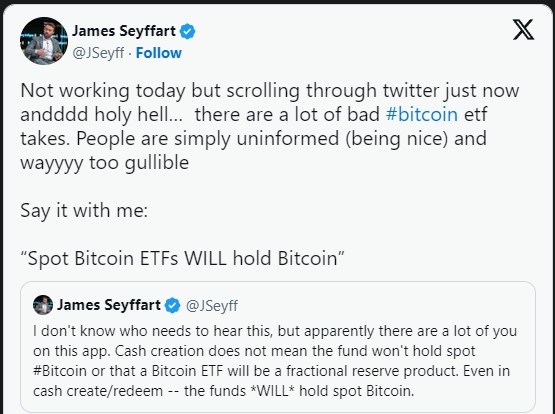The United States Securities and Exchange Commission (SEC) has mandated a cash creation model for the spot Bitcoin (BTC) ETF, which is thought to have led to some misunderstandings in the industry, and Bloomberg’s Senior ETF Analyst James Seyffart commented to correct some of these misconceptions.
Ending the Bitcoin ETF Myths
Many companies applying for a Bitcoin ETF product have succumbed to the SEC’s specified “Cash Creation” demand, which seems to have led some people to believe that adopting this model means the fund will not hold Bitcoin.
Some believe that after the approval of a Bitcoin ETF product, it could function as a partial reserve product. However, Seyffart clearly stated that “Spot Bitcoin ETFs will hold Bitcoin.”

In response to the announcement, crypto followers commented on X, including an investor who wanted to know if ETF issuers would publish onchain addresses, among other questions. This investor emphasized that the public could check and verify how the cash creation model works.
Cash Creation and In-Kind Model
The difference between the cash creation model and its counterpart, the in-kind model, was explained through documents presented by BlackRock in a previous meeting with the SEC. Talking about the in-kind model, it involves a simple 5-step process that begins with a market maker (MM) making a redemption request through an authorized participant (AP).
The ETF issuer then approves the order. Additionally, the MM purchases ETF shares through a Quotation Board. As a result, the ETF share is sent by the MM to a broker.
Regarding the cash model, the ETF issuer must first instruct the BTC to be sold to the broker after the MM initiates the redemption process. Then, the MM can start a transaction with the ETF issuer to purchase BTC in exchange for USD.
According to documents that have emerged so far, BlackRock and WisdomTree have accepted the cash creation model. Following them, Grayscale also added this to their latest amendment file and are now taking steps to meet expectations with the hope of getting approval by emphasizing that cash orders are accepted.

 Türkçe
Türkçe Español
Español









